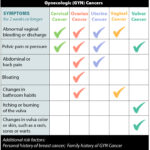Advanced options to treat your cancer.
We are with you every step of your cancer journey, from day one until you ring the bell signaling your last treatment. You and your health are our top priority. You can have peace of mind knowing you have access to the latest technology and support.
Our team treats a variety of cancers including:
- Breast cancer which starts when cells in the breast begin to grow out of control and usually form a tumor that can be seen on an x-ray or felt as a lump. Breast cancer is most common in women, but men can get it too. We offer 3D mammography and the latest techniques to detect and treat breast cancer as quickly as possible.
- Gynecologic cancer, including cervical, ovarian, uterine, vaginal, and vulvar cancers.
The symptoms for each cancer vary [pdf].

Talk to your doctor if you notice any unusual changes with your body such as:- Abdominal or back pain
- Abnormal bleeding
- Bloating
- Changes in color of skin or bathroom habits
- Itching or burning
- Pelvic pain or pressure
We offer the region’s most advanced treatment options for fighting your cancer.
treatment options
-
Surgery
Surgery is the most common treatment for breast cancer depending on the size and stage of the cancer. Types of surgeries include the following. Learn more.
- Breast Conservation Surgery: Complete removal of the breast cancer with as little loss to the woman’s natural breast as possible. Breast conservation surgeries include lumpectomy and partial mastectomy.
- Hidden Scar™ Breast Surgery: Minimizes visible scarring by removing cancerous tissue through a single incision, usually along the edge of the nipple or the underside of the breast.
- Breast Reconstruction: Creates a breast mound that comes as close as possible to the form and appearance of the natural breast.
- Oncoplastic Surgery: Ensuring symmetry with both breasts following a lumpectomy.
Gynecologic (GYN) cancer surgery typically involves removal of the tumor. Woman’s offers the latest treatment options, including robotic GYN surgery. Learn more about gynecologic surgery.
-
Chemotherapy/Infusion
Medical oncology includes treatments such as chemotherapy, infusion, hormonal therapy, biological therapy and targeted therapy. In addition, our team includes highly-specialized breast oncologists and gynecologic oncologists for diagnosing and treating cancers. Gynecologic oncologists have completed obstetrics and gynecology residency and then pursued sub-specialty training through a gynecologic oncology fellowship. This treatment is provided to patients by Our Lady of Lake.
-
Radiation Oncology
Radiation oncology uses different types of radiation, including X-rays, gamma rays, or electrons, to treat cancers and may be used in conjunction with surgery and/or chemotherapy. Innovative techniques, such as breath hold and brachytherapy, can improve care for breast and gynecological cancer patients. At the Breast & GYN Cancer Pavilion, radiation oncology services are provided by Woman’s Hospital and Mary Bird Perkins Cancer Center.
-
Gamma Knife Icon
Gamma Knife Icon (GKI) is an innovative, noninvasive radiosurgery technology for the treatment of primary brain tumors, brain metastases, and other central nervous system conditions. The first of its kind in the Gulf South, GKI treats only the parts of the brain that need it, enhancing quality of life. To learn more about the Gamma Knife Icon, click here.
-
Clinical Trials
Clinical trials enhance standard cancer treatments, resulting in improved patient outcomes and survival rates. We conduct oncology clinical trials to test new drugs or a new combination of drug treatments, new surgery and radiation therapies, and new medical devices. A drug must be part of a clinical trial before the FDA will approve it to be put on the market.
To learn more about signing up for a clinical trial:
“You are braver than you believe, stronger than you seem, smarter than you think, and twice as beautiful as you’d ever imagined.”





